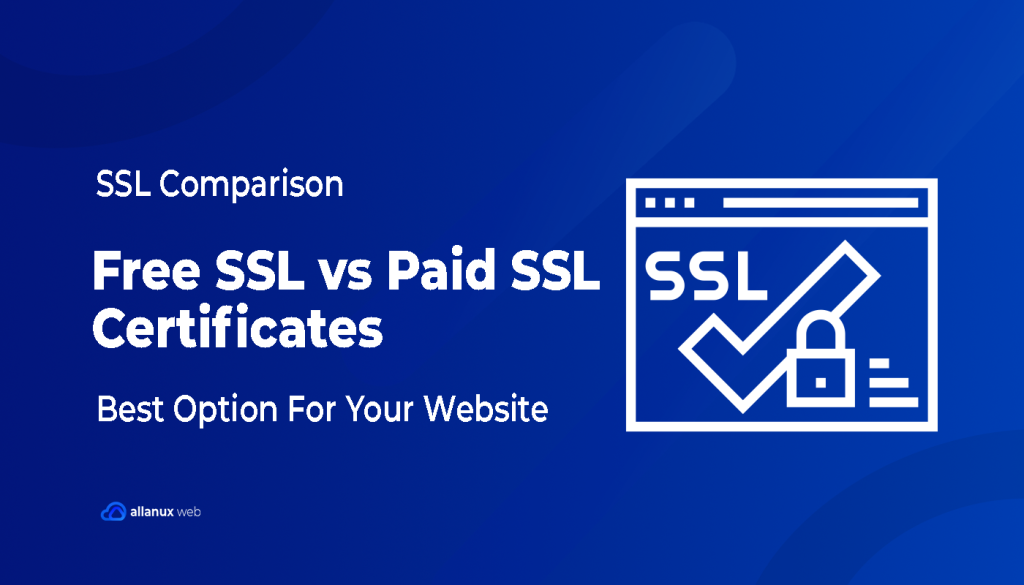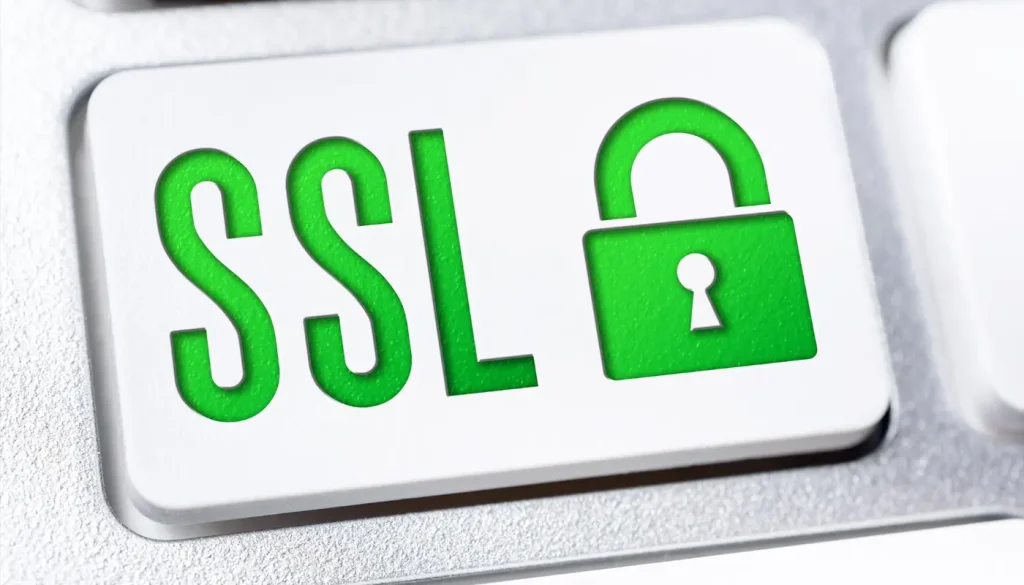Choosing a free SSL certificate or a paid one can be hard. Knowing the differences and benefits can help decide the best SSL for your site.
What is SSL and How Does it Work?
SSL (Secure Sockets Layer) keeps data safe between servers and browsers. It changes HTTP to HTTPS. This keeps your information private and checks the website’s identity, shown by a padlock icon.
Types of SSL Certificates
There are many SSL certificates like Domain Validation (DV), Organization Validation (OV), and Extended Validation (EV). Each offers different security levels. DV certificates work with most browsers.
EV certificates need a thorough check using government databases. They may show a green address bar, telling visitors the site is secure.
Free SSL Certificates: Features and Limitations
Free SSL options offer a secure connection for your site at no cost. Providers like Let’s Encrypt let you use HTTPS on your site for free. This helps protect the data shared between your server and visitors. Still, it’s essential to know the goods and the bads of using them.
Advantages of Free SSL Certificates
Free SSL certificates have several key benefits:
- Cost-effective: They’re free, saving money for small businesses and individual owners.
- Ease of acquisition: Getting and setting up a certificate can take less than five minutes.
- Basic encryption: They offer strong encryption, much like paid ones, safeguarding user data.
- Enhanced SEO: Over 50% of Google’s first-page results are HTTPS, making SSL key for visibility.
Drawbacks of Free SSL Certificates
But, free SSL certificates also have downsides:
- Short validity period: They last for 90 days, requiring more frequent updates than paid versions.
- Limited validation: They only support Domain Validation, not higher levels needed for more trust.
- Lack of support: There’s minimal help available, so you might need to solve issues on your own.
- Geographical restrictions: Some providers limit where you can use free SSLs, affecting availability.
- Compatibility issues: Paid SSLs work with almost all browsers; free ones can run into problems.
Knowing these pros and cons helps decide if free SSLs are right for your site or if paid ones are better.
Paid SSL Certificates: Is It Worth the Investment?
Investing in paid SSL certificates benefits businesses handling sensitive data and building customer trust. Up to 82% of web users avoid sites marked as “not secure.” So, security is a must. Let’s explore the importance of paid SSL certificates.
Benefits of Paid SSL Certificates
Paid SSL benefits are notable compared to free versions:
- Enhanced Security: Organization validation (OV) and extended validation SSL (EV) paid certificates offer better authenticity checks. They make your site more trustworthy.
- Extended Validity Periods: Paid SSLs last up to two years, unlike free ones that need renewal every 90 days.
- Warranty Protection: Paid SSLs come with warranties from $10,000 to over $1 million. This offers financial protection against SSL failure data breaches.
- Around-the-Clock Support: 24/7 tech support comes with paid SSL certificates. It ensures quick fixes for any issues.
- Brand Perception and Trust: A secure site seal and detailed validation info increase customer confidence. This can lead to more conversions.
Investing in a Paid SSL: Factors to Consider
Before choosing a paid SSL certificate, think about these points:
- Type of Validation: Decide if you need Domain Validation (DV), organization validation (OV), or extended validation SSL (EV). OV takes 1-2 days, while EV can take 3-6 but offers the highest assurance.
- Warranty Coverage: Check the warranty amount. Higher warranties mean better protection against financial losses from data breaches.
- Technical Support: Make sure the SSL provider gives excellent customer support. It’s vital for resolving problems fast and keeping your site secure.
- Usage Needs: Think about if you need extra features like wildcard certificates for many subdomains or dedicated IP addresses, often included in paid SSL packages.
- Cost vs. Benefit: Paid SSL certificates cost money but offer more security, customer trust, and can improve Google search rankings.
In short, free SSL certificates are okay for small sites and blogs. But, paid SSL certificates are crucial for e-commerce, financial institutions, and businesses valuing customer trust and data security. paid SSL benefits, like extensive warranty and organization validation, make paid SSL a smart choice for strong online security and gaining customer confidence.
Free SSL vs Paid SSL Certificate: Direct Comparison
The choice between free vs paid SSL certificates is essential for your site’s safety and trust. We’ll look at the similarities and differences to guide your decision. You’ll learn about free SSL options like Let’s Encrypt, Cloudflare, and Amazon. Also, about paid ones such as Sectigo, DigiCert, and Thawte.
Similarities Between Free and Paid SSL Certificates
Free and paid SSL certificates use the same key technologies to protect your data. They share some common points:
- Secure encryption: Both use the SHA-256 algorithm and TLS 1.2 and 1.3 for safe data transmission between your site and browsers.
- HTTPS Protection: They both enable HTTPS, which helps with SEO and gains users’ trust.
- Asymmetric Encryption: Both use 2048-bit RSA keys, ensuring strong encryption no matter the certificate’s price.
Key Differences Between Free and Paid SSL Certificates
While their main job is the same, there are key differences to note:
- Validation Levels: Paid SSL certificates offer more validation levels like DV, OV, and EV. Free options usually just offer domain validation.
- Validity Period: Free SSLs are often only good for 90 days and need renewing often. Paid ones can last a year or more.
- Additional Features: Paid SSLs may come with extras like vulnerability checks, daily malware scans, and trust seals to boost visitor confidence.
- Warranties: Free SSLs don’t typically come with warranties. Paid ones can offer warranties that cover from $10,000 to over a million dollars, adding an extra security layer.
- Browser Compatibility: Paid SSLs generally cover 99.9% of browsers, offering wider compatibility than free SSLs.
- Technical Support: Free SSLs usually don’t offer direct support. Paid SSL providers often include helpful technical support in their packages.
- Usage Limitations: Free SSLs from Cloudflare and Amazon may only be for their clients. Paid SSLs often have more flexible use terms, without such restrictions.
- Security Risks: Though both encrypt, free SSLs have been misused for phishing and scams. Paid ones, with stricter validation, are less likely to be misused.
Understanding the differences between free vs paid SSL certificates helps you choose the right secure encryption. It ensures you pick the best protection for your online presence.
Get Free SSL Certificate From Allanux Web
Small business owners often find securing a website hard and expensive. But Allanux Web has a great offer: free SSL certificates. This is perfect for new startups or small websites. It’s a way to make web data safe without spending a lot.
One big plus of Allanux Web free SSL is how easy it is to add to your site. We make things simple so you can focus on your business, not on tech stuff. A free SSL from Allanux Web moves your site to HTTPS. This makes users trust your site more and helps with search engine ranks.
To make your website safe for free with Allanux Web, think about these benefits:
- Cost-efficiency: You save money since SSL certificates can be pricey, ranging from $8 to $1000 a year.
- User Trust: Encrypting your web data builds trust with visitors. It’s key for business. In fact, 93% of customers trust businesses with professional websites more.
- Improved SEO: Search engines prefer HTTPS. Securing your site can really help with SEO.
Allanux Web is dedicated to easy website security. Choosing Allanux Web free SSL means strong encryption at no extra cost. It’s perfect for small websites and entrepreneurs wanting to secure their online space efficiently.
Conclusion
Choosing the right SSL certificate is key for a safe online space. Both free and paid versions offer encryption to keep data safe. Yet, what you pick should match what your business needs and how much you want to make your visitors feel safe.
For businesses dealing with sensitive info, paid SSLs are best. They have high-level security like 256-bit encryption and PCI compliance. This ensures your website is very safe.
Free SSL certificates, from places like Let’s Encrypt and Cloudflare, are good for small businesses or blogs with little money. These last for 30-90 days and provide basic encryption. They are good for basic security needs without spending much.
On the flip side, paid SSL certificates like those from Entrust start at $8.00 a year. They can last up to two years. They offer strong security features perfect for online shops, big companies, and busy websites.
These certificates also boost your site’s SEO ranking and make customers trust you more. When picking an SSL certificate, think about the costs and benefits. This ensures your site stays safe, trusted, and properly checked.
FAQ
What is SSL and How Does it Work?
SSL (Secure Sockets Layer) keeps web servers and browsers safe by encrypting data. It keeps data private and safe from others. Adding an ‘S’ to HTTP, which becomes HTTPS, SSL securely sends data with encryption. It also checks website identities with a padlock icon.
What are the different types of SSL Certificates?
There are three SSL certificates: Domain Validation (DV), Organization Validation (OV), and Extended Validation (EV). DV SSL certificates are basic and easy to get. OV SSL certificates need more checks on organization details. EV SSL certificates are the top level and show the organization’s verified name.
What are the advantages of Free SSL Certificates?
Free SSL certificates, like those from Let’s Encrypt, provide encryption for free. They make HTTPS possible on websites and are simple to get. These certificates give the same encryption level as paid ones, keeping data safe.
What are the drawbacks of Free SSL Certificates?
Free SSL certificates offer basic encryption but miss out on extended validation, warranty, and strong support. They are short-lived (90 days), need frequent renewals, and may not fit sensitive data sites.
What are the benefits of Paid SSL Certificates?
Paid SSL certificates last up to 27 months and offer high validation like EV. They come with a warranty for data breaches. These certificates have strong support and show verified organizational details. This boosts trust and confidence in users.
What factors should you consider when investing in a Paid SSL Certificate?
For a paid SSL certificate, think about your website’s data needs, the trust level you want, whether you need OV or EV, and the provider’s warranty and support.
What are the similarities between Free and Paid SSL Certificates?
Free and paid SSL certificates both provide necessary encryption for safe data transfer between browsers and servers. They allow HTTPS, improving security and SEO rankings. Basic encryption is the same in both, ensuring data is protected.
What are the key differences between Free and Paid SSL Certificates?
The main differences between free and paid SSL certificates are in validation, extra features, and support. Paid certificates bring extended validation (EV), warranty, and support. Free certificates mainly offer basic validation (DV) without extras.
How can I get a Free SSL Certificate from Allanux Web?
Allanux Web gives free SSL certificates that are easy to use. Perfect for new companies and small sites. Allanux Web’s free SSLs offer basic encryption and HTTPS. This secures your site and boosts search ranks at no cost.





